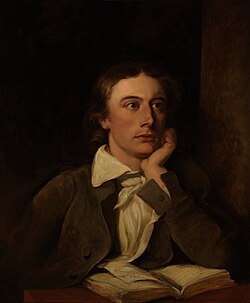Keats
| John Keats | |
|---|---|

Portrait of John Keats by William Hilton. National Portrait Gallery, London
|
|
| Born |
31 October 1795 Moorgate, London, England |
| Died | 23 February 1821 (aged 25) Rome, Papal States |
| Occupation | Poet |
| Alma mater | King's College London |
| Literary movement | Romanticism |
John Keats (/ˈkiːts/; 31 October 1795 – 23 February 1821) was an English Romantic poet. He was one of the main figures of the second generation of Romantic poets, along with Lord Byron and Percy Bysshe Shelley, despite his work having been in publication for only four years before his death.
Although his poems were not generally well received by critics during his lifetime, his reputation grew after his death, and by the end of the 19th century, he had become one of the most beloved of all English poets. He had a significant influence on a diverse range of poets and writers. Jorge Luis Borges stated that his first encounter with Keats's work was the most significant literary experience of his life.
The poetry of Keats is characterised by sensual imagery, most notably in the series of odes. This is typical of romantic poets, as they aimed to accentuate extreme emotion through the emphasis of natural imagery. Today his poems and letters are some of the most popular and most analysed in English literature.
John Keats was born in Moorgate, London, on 31 October 1795 to Thomas Keats and his wife, born Frances Jennings. There is no clear evidence of his exact birthplace. Although Keats and his family seem to have marked his birthday on 29 October, baptism records give the date as the 31st. He was the eldest of four surviving children; his younger siblings were George (1797–1841), Thomas (1799–1818), and Frances Mary "Fanny" (1803–1889) who eventually married Spanish author Valentín Llanos Gutiérrez. Another son was lost in infancy. His father first worked as a hostler at the stables attached to the Swan and Hoop Inn, an establishment he later managed, and where the growing family lived for some years. Keats believed that he was born at the inn, a birthplace of humble origins, but there is no evidence to support his belief. The Globe pub now occupies the site (2012), a few yards from the modern-day Moorgate station. He was baptised at St Botolph-without-Bishopsgate, and sent to a local dame school as a child.
...
Wikipedia
